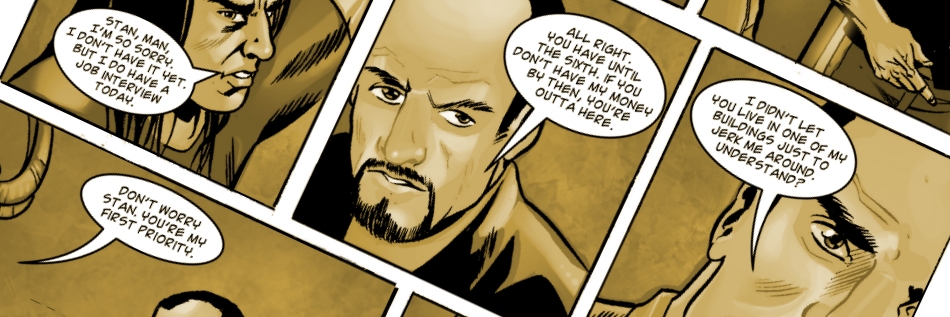
10 Do’s and Don’ts When Submitting to Comic Book Publishers
Sunday, November 10, 2013 | Brandon Rhiness
I have been self-publishing comics for a couple of years now. Even though I’m relatively new to the game I do have some hints to help artists and writers looking for work in the comic book industry.
When I post ads and go looking for artists and writers I’m amazed at how many otherwise talented people screw up their chances by doing things to get themselves rejected.
I’m not sure if the big publishers would agree with me on all these points, but I’d bet they would.
When I look for talent I get hundreds of responses. Follow these rules to make sure your name stays at the top of my list. Also use these rules when approaching other companies.
1. Make sure you send sequential pages.
When I’m looking to hire an artist I need to see their panel-to-panel storytelling abilities. No matter how much I stress this point more than half of the art submissions I get do not have any sequential samples. I’m not going to hire you if all you send me are a bunch of pictures of Wolverine and Deadpool.
2. Give your page rate when asked for it.
Don’t sell yourself short. You should know what your skills are worth, so don’t be afraid to ask for what you’re worth.
When I’m looking to hire a new artist I always ask them for their page rate. I’d say less than half of people who respond give it to me. Also, don’t give an estimate and say you’re willing to negotiate. I don’t have time to be negotiating over such things and the person you, as an artist, are dealing with is only going to negotiate down. So again, you’d be selling yourself short.
Don’t be afraid of asking for a rate higher than you’re comfortable with. You never know what the other party is willing to pay. Obviously, don’t ask for something ridiculous, but I’ve dealt with a lot of artists that I’d be willing to pay more than they’re asking for. Don’t sell yourself short!
3. Make it easy for the person hiring you.
When I have hundreds of submissions to go through the last thing I want is for someone to make my life difficult. A lot of people frustrate me in their very first contact with me.
If you have links to your work in the email, make sure they work. Also, make sure the link goes directly to the work you want me to see (the sequential work). Don’t send me to your homepage and expect me to search around your site for it.
Also, don’t send me a link to a site where I have to sign up and get an account just to see your samples. I won’t do it.
4. Don’t ask me to publish your comic book.
I realize it’s hard self-publishing comics, but if you are responding to an ad I posted looking for a writer or artist, do not email me asking me to publish your comic.
5. Use correct spelling.
I can’t stress this enough. I’m not expecting you to be Shakespeare, but use appropriate language, grammar and spelling. I don’t mind if there’s a conversational tone to it but it shouldn’t read like a text message.
It amazes me that someone will respond to an ad for a writing gig and their email will be full of spelling mistakes and obvious grammatical errors.
The biggest and most common ones I see are run-on sentences that go on forever and spelling their name (and mine) without a capital letter. Sentences should begin with a capital letter and end with a period. When referring to yourself, use “I”, not “i”.
6. Don’t ask me to give you a chance when you have no experience.
I have enough work on my plate as it is. I can’t be coaching somebody through the process of making comics. If you want to be hired as a comic book artist you need to have experience drawing comics. There’s no way around it.
I don’t mind hiring people who are just starting out. But if you don’t even have a sample of sequential work to show me, I can’t hire you.
I’ve fallen for this three times now and I won’t do it again. Somebody will contact me saying it is their dream to work in comics. They’ll beg for a chance to prove themselves. Even though they don’t have any samples to show me, they say they can “blow me away” if given a chance. They’ll ask for a sample script to draw from. Of course, given my desire to help people out, I’ll send them a sample script. And I never hear from them again.
You have to make your own breaks. You have to work for it. You can’t expect to sit around wishing you could break into the comic industry and not do the necessary work. Nobody is going to give you a chance if you don’t do your share of the work.
7. Don’t ask for large sums of money up front.
I know you are worried about being ripped off. But so am I. I am not going to send $500 or $1000 via PayPal to somebody I’ve never met. I don’t care how good their work is. So don’t even ask.
I pay all my artists after every one or two pages. That way I make sure the work gets done and the artist doesn’t have to do a lot of work while wondering if they’ll get paid.
It doesn’t take long before trust is built. I don’t know why more people don’t do it this way. It’s fair.
8. Do the work!
Making comics is hard. I know. Make sure you know what you’re in for before you agree to do a project with someone. I’ve had countless people who have been excited to get started, have signed a contract, and have received the page scripts from me, then disappeared off the face of the Earth.
Of course, a few days later I’ll see them posting on message boards, looking for gigs.
This is another reason I don’t pay anybody in advance.
9. Do a little bit of research.
Make sure you learn about the person or company you are submitting your work to. See what kind of projects they are producing to make sure your work is in line with the kind of stuff they’re interested in.
I always look favourably on people who take a little time to learn about me and the projects we’re doing at the Higher Universe. Buying a digital copy of one of our comics will definitely put you in our good books.
It’s not really about the money. It just shows that you’ve taken the time to learn about us and are familiar with our work.
If I get the impression that you’re just copying and pasting the same thing to every publisher you can find, I won’t be happy. But if you show that you know about us and are contacting us specifically you are more likely to get your foot in the door.
Never use “To whom it may concern.” Addressing me by name is a sure-fire way to put a smile on my face.
10. Give it time.
I get hundreds of responses and I’m only producing a small handful of comics (at the moment). I try to respond to everyone whose work I like, but I won’t be able to hire everybody at once. But I do keep a list of hopefuls and sometimes contact them to do some work. So keep your hopes up and don’t be afraid to drop me a line to keep in touch.
Overall my experiences since I started making comics a couple of years ago have been positive. It’s a rewarding pursuit and it’s really fun.
There are a lot of great artists and writers out there and more are appearing on the scene every day.
I’ve made a lot of great friends along the way with artists, writers and other comic book creators, and I’m looking forward to meeting even more great people.
Feel free to share your thoughts on this topic. I’m interested in hearing about other people’s thoughts and experiences. And be sure to let me know if there’s anything I can do to help you out.

